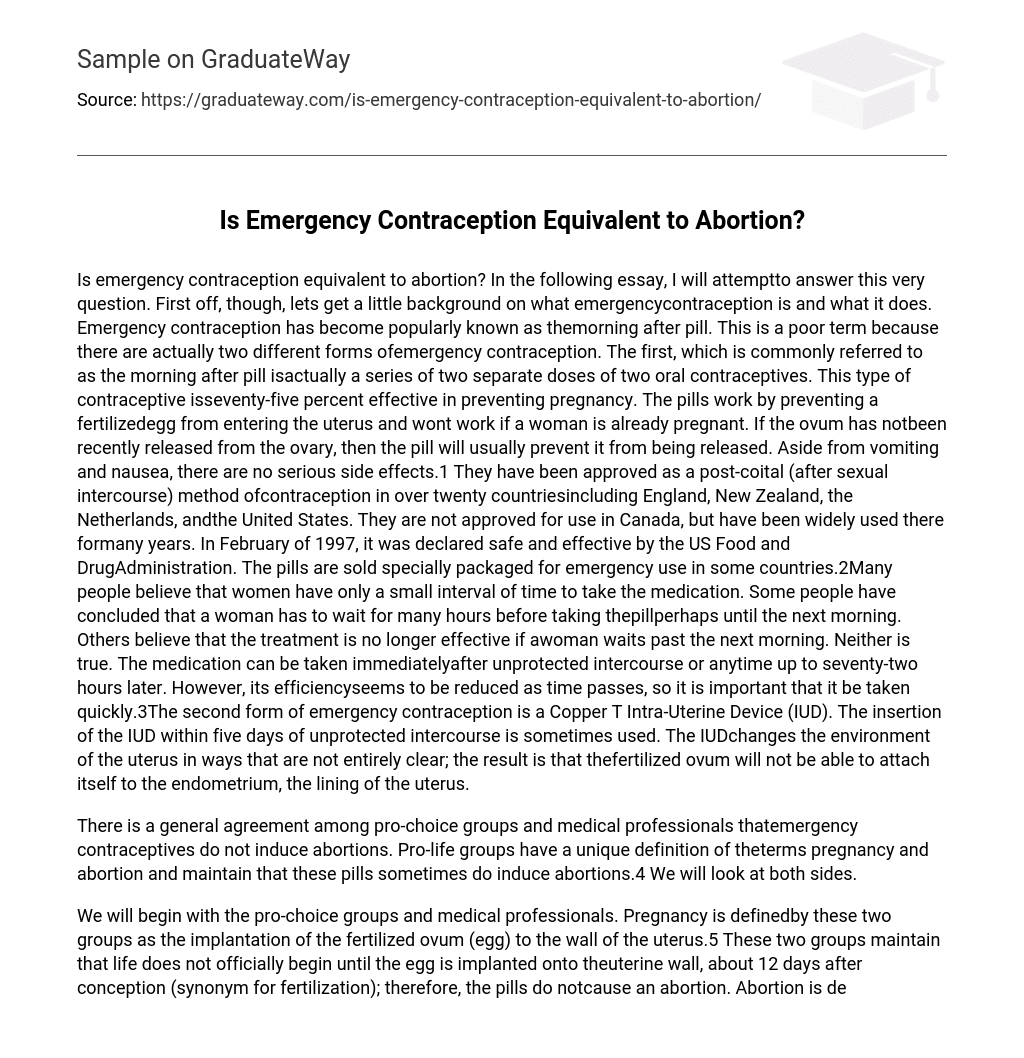Is emergency contraception equivalent to abortion? In the following essay, I will attemptto answer this very question. First off, though, lets get a little background on what emergencycontraception is and what it does. Emergency contraception has become popularly known as themorning after pill. This is a poor term because there are actually two different forms ofemergency contraception. The first, which is commonly referred to as the morning after pill isactually a series of two separate doses of two oral contraceptives. This type of contraceptive isseventy-five percent effective in preventing pregnancy. The pills work by preventing a fertilizedegg from entering the uterus and wont work if a woman is already pregnant. If the ovum has notbeen recently released from the ovary, then the pill will usually prevent it from being released. Aside from vomiting and nausea, there are no serious side effects.1 They have been approved as a post-coital (after sexual intercourse) method ofcontraception in over twenty countriesincluding England, New Zealand, the Netherlands, andthe United States. They are not approved for use in Canada, but have been widely used there formany years. In February of 1997, it was declared safe and effective by the US Food and DrugAdministration. The pills are sold specially packaged for emergency use in some countries.2Many people believe that women have only a small interval of time to take the medication. Some people have concluded that a woman has to wait for many hours before taking thepillperhaps until the next morning. Others believe that the treatment is no longer effective if awoman waits past the next morning. Neither is true. The medication can be taken immediatelyafter unprotected intercourse or anytime up to seventy-two hours later. However, its efficiencyseems to be reduced as time passes, so it is important that it be taken quickly.3The second form of emergency contraception is a Copper T Intra-Uterine Device (IUD). The insertion of the IUD within five days of unprotected intercourse is sometimes used. The IUDchanges the environment of the uterus in ways that are not entirely clear; the result is that thefertilized ovum will not be able to attach itself to the endometrium, the lining of the uterus.
There is a general agreement among pro-choice groups and medical professionals thatemergency contraceptives do not induce abortions. Pro-life groups have a unique definition of theterms pregnancy and abortion and maintain that these pills sometimes do induce abortions.4 We will look at both sides.
We will begin with the pro-choice groups and medical professionals. Pregnancy is definedby these two groups as the implantation of the fertilized ovum (egg) to the wall of the uterus.5 These two groups maintain that life does not officially begin until the egg is implanted onto theuterine wall, about 12 days after conception (synonym for fertilization); therefore, the pills do notcause an abortion. Abortion is defined as induced termination of pregnancy before the fetus iscapable of independent survival.6 Since the termination of a pregnancy is not taking place andthe prevention of a pregnancy is, an abortion is not being performed by the pills. In addition,since the pills have no effect on an ovum already implanted on the uterine wall, an abortion cannottake place in this instance either.
On the other hand, pro-life groups believe that pregnancy begins at the moment the egg isfertilized by a sperm.7 Based on their definition, they believe that if the pills cause the ovum tonot implant itself to the uterine wall, then the pregnancy has been terminated thus an abortion hastaken place. They also believe that if the pills are taken and the egg has not yet been fertilized bya sperm, that the pills were merely a contraceptive and were not abortifacients, something toinduce an abortion to take place. On February 25, 1997, the Christian Medical and DentalSociety of Bristol, TN issued a press release. Using the pro-life definition of pregnancy, theystated that:Contrary to the belief of some, the so calledmorning-after pill will dramatically increasenot decreasethetragic number of abortions in this country. The public is beingmisled into believing that this concoction prevents a pregnancywhen actually in most cases it will abort a pregnancy. . .Approvingand promoting these pills is not only medically irresponsible, it isalso sending the wrong message to the American Public. Instead ofpromoting this as an alternative for family planning, we should beemphasizing sexual responsibility. 8Finally, after viewing both sides objectively, I will have to agree with the pro-life groups. I agree that life begins at the very moment of conception. It is at that point when the zygoteforms and cell division begins to take place. Although the egg has not yet implanted itself to theuterine wall, the cell is still alive and fully functional. It has its own DNA code and its own bloodtype and if anything prevents this beings ability to continue to develop, it is preventing the rightto life and is therefore inducing an abortion. Furthermore, the only way that emergencycontraception would not be considered an abortifacient is if the egg had not been fertilized by asperm, or the eggs release from the ovary was prevented. In my opinion, these types of contraceptives are just one more excuse for ourirresponsibility. We should be emphasizing more on sexual responsibility instead of promoting analternative for family planning, just like the Christian Medical and Dental Society stated in theirpress release. I believe that if you are going to play, then you will have to pay. I dont believethat the pill or IUD should be used in cases of rape or incest. It is not the developing babys faultthat his father was a sex-crazed maniac; therefore, his life should not be taken. There are otheralternatives to aborting the pregnancy, such as adoption, that can be considered in these cases. Many families cannot have children and would love to have one become available to them throughadoption.





